This article is produced and sponsored by The Islamic Food and Nutrition Council of America (IFANCA®). It was first published in the State of the Global Islamic Economy 2020/21 report produced by DinarStandard and supported by the Dubai Islamic Economy Development Centre. The report can be downloaded from here.
Halal certification is more than a logo and more than a regulatory requirement – it’s thought leadership, a sustainable institution, a committed community with dedicated partnerships, integrated compliance and the growth engine of the global Islamic economy. It enables food security and nutrition equity to one fourth of the world’s population.
The development of the halal economy is dependent on a solid infrastructure.
In the food, pharmaceutical and cosmetics space this goes beyond understanding ingredients. It includes developing halal guidelines and requirements and maintaining strict compliance programs to gain the trust and confidence of all stakeholders.
Food and nutrition are basic human needs. For Muslims, consuming Halal products is not a choice, it is a matter of faith. Every person is entitled access to essential nutrition. Halal certification makes this possible for over a billion consumers.
Paving the way for the halal economy
The Islamic Food and Nutrition Council of America (IFANCA®) was founded in 1982 to address the needs of halal consumers in a changing global landscape. Since inception, IFANCA has been at the forefront of finding solutions to complex issues.
When the global halal community was concerned about the use of alcohol in flavors and consumer goods, IFANCA conducted organoleptic tests, in 1986, to determine the level where it had no detectable sensory impact. Today, that level has been adopted by most regulatory bodies and incorporated into standards.
As the halal community struggled with the presence of gelatin in food and pharma, IFANCA developed a traceability system that tracks the production and movement from the cow to the consumers, so that the users can trust their nutritional supplements were undoubtedly Halal.
When the US government decided to provide halal and kosher meals to the soldiers, we worked with the food industry, specifically with a company called My Own Meals (R) to develop Halal certified meals ready-to-eat (MREs). In addition, this made it possible for food supplies to be provided to Muslims in regions afflicted by natural or man-made disasters.
On the new technology side, IFANCA certified as halal, the very first GMO ingredient in the world, the enzyme chymosin, making the production of Halal certified cheese products more feasible.
IFANCA best practices have been incorporated by key industry players such as Abbott, Pepsico, Coca Cola, Pfizer, and Cargill. Working with halal certification bodies throughout the world, our pioneering work continues.
Since 1999, IFANCA has been hosting annual conferences that bring together industry, regulators and certifying bodies to address key issues in the halal regulatory space.
Working with regulators and certifiers we co-founded the World Halal Food Council, a global membership organization working to increase cooperation among halal certifiers.
We have built a global halal community which is committed to making halal a mainstay in industry regulatory best practices. To our clients, we are not simply a certifier, but a partner that is key to successful compliance programs. IFANCA guidelines have touched every part of the supply chain — from raw ingredients to finished goods.
In recognition of its efforts, IFANCA received the Global Islamic Economy award from Dubai in 2013, for halal compliance and standardization.
Our work plays a critical role in the practice of consuming halal products for billions of halal consumers around the world. From emerging markets to developed economies, from supermarkets to campus dining, IFANCA is addressing the challenges of food security and nutrition equity.
Looking ahead, IFANCA will continue its work to harmonize standards further and to share best practices with all stakeholders. With our partners in industry and regulatory, we look forward to building even greater acceptance of halal products among all consumers.
It has been an amazing journey that was possible only with the partnership of certification and accreditation bodies, government regulators, educators, marketers, importers, exporters, manufacturers, and customers.
At IFANCA, we are very proud of the work we do – because halal certification is more than a logo and more than a regulatory requirement.
This article is produced and sponsored by The Islamic Food and Nutrition Council of America (IFANCA®). It was first published in the State of the Global Islamic Economy 2020/21 report produced by DinarStandard and supported by the Dubai Islamic Economy Development Centre. The report can be downloaded from here.

